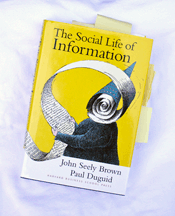Thoughts about libraries—what they are, what they could be, and the world of things that influence them.
A single sentence from John Seely Brown and Paul Duguid—two guys who never fail to be thought provoking—gives me just the place to start: “The way forward is paradoxically to look not ahead, but to look around.”
When Brown and Duguid’s classic collection The Social Life of Information came out in 2000, I’d already read some of the articles in their original venues, places like First Monday. The printed book found a place on my personal reference shelf, and it’s now penciled with margin notes and decorated with yellow stickies that flag pages I might want to find quickly. (I’ll pencil notes in a book, but I’ve never been able to bring myself to dog-ear the pages, have you?)
One of my favorite sections is the introduction, “Tunneling Ahead.” Better than anyone I can think of, Brown and Duguid see the value of context, of appreciating “the social periphery, the communities, organizations, and institutions that frame human activities,” and the risks of putting on blinders that focus our vision too narrowly. Yes, driving ourselves toward particular goals can keep us directed and productive, but if we limit our view too much we might miss something important in the passing scenery. Something outside of the library, something in the periphery, something that could inform the process or even change the goals. A political trend. A new technology. A cultural shift.
The more we understand the context for libraries—the changing information landscape, the characteristics and values of our communities, and the information needs of our users—the more we can keep our libraries both grounded and adaptable.
If you haven’t read The Social Life of Information, you might check out the introduction. Or just look around, and see what catches your eye. Ω
Resources
“Introduction,” in: The Social Life of Information by John Seely Brown and Paul Duguid. First Monday, volume 5, number 4, 3 April 2000.
“The more we understand the context for libraries, the more we can keep our libraries both grounded and adaptable.”


Comments are closed.